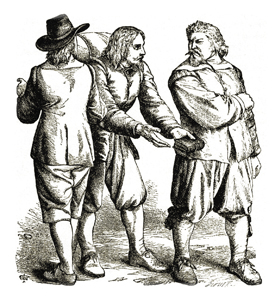A Guide to John Bunyan's The Pilgrim's Progress
Notes and Commentary on
The Pilgrim's Progressby Ken Puls
4. Encounter with Neighbors
The Neighbors also came out to see him run; and as he ran, some mocked, others threatened, and some cried after him to return; and among those that did so, there were two that resolved to fetch him back by force. The name of the one was Obstinate, and the name of the other Pliable. Now, by this time, the man was got a good distance from them; but, however, they were resolved to pursue him, which they did, and in a little time they overtook him. Then said the man, Neighbors, wherefore are you come? They said, To persuade you to go back with us. But he said, That can by no means be; you dwell, said he, in the City of Destruction, the place also where I was born. I see it to be so; and, dying there, sooner or later, you will sink lower than the grave, into the place that burns with fire and brimstone: be content, good neighbors, and go along with me.
What! said Obstinate, and leave our friends and comforts behind us?
Yes, said Christian (for that was his name), because that all which you shall forsake is not worthy to be compared with a little of that that I am seeking to enjoy; and if you will go along with me, and hold it, you shall fare as myself; for there, where I go, is enough to spare. Come away, and prove my words.
Obstinate: What are the things you seek, since you leave all the World to find them?
Christian: I seek an inheritance incorruptible, undefiled, and that fadeth not away; and it is laid up in heaven, and safe there, to be bestowed, at the time appointed, on them that diligently seek it. Read it so, if you will, in my Book.
Notes and Commentary
No sooner had Christian taken leave of Evangelist to pursue eternal life than his actions were noticed by the world. He was forsaking the pleasures and ways of the world to find "an inheritance incorruptible, undefiled, and that fadeth not away" (1 Peter 1:4). Not willing to lose one of its own so easily, the world pursued him, to mock and ridicule, and if possible "fetch him back by force."
Christian was soon overtaken by two citizens of the City of Destruction: Obstinate, a stubborn, close-minded man who would have nothing to do with the gospel; and Pliable, a man easily swayed and led by those of a stronger character. These two engaged Christian in a conversation to make sport of him and his religion. Though having only a little light and instruction, and in fact, not even yet converted at the cross, Christian gladly and earnestly spoke with them. Having heard the truth from Evangelist, he now becomes an evangelist to spread the warning of coming judgment and the hope of the gospel.
Herein we can find hope and encouragement. Often we think of an evangelist as one with a special gift and calling who devotes his life and ministry to the spread of the gospel across the world. But, in fact, all Christians can and should be evangelists. Christian took the scorn of the world and seized upon it as an opportunity to share the light he had been given. He did not run from the world, afraid that he would be laughed at or fearing he knew too little doctrine to face the world's opposition. Instead he invited Obstinate and Pliable to "go along with me" and tells them "Come away, and prove my words."
We must pray for the same love that Christian had for his neighbors. They lived on the brink of destruction and Christian had received warning and hope of the way to escape. Like Christian, how could we possibly not speak when God brings the lost across our path?
Continue Reading: 5. Ridiculed by Obstinate
Return to 3. Christian Flees Destruction
The text for The Pilgrim's Progress
and images used are public domain
Notes and Commentary ©1997 Ken Puls"A Guide to John Bunyan's The Pilgrim's Progress"
was originally published from January 1993 to December 1997
in "The Voice of Heritage," a monthly newsletter
of Heritage Baptist Church in Mansfield, TexasUnless otherwise indicated, all Scripture quotations are from
the New King James Version (NKJV) ©1982 by Thomas Nelson, Inc.Return to A Guide to John Bunyan's The Pilgrim's Progress
